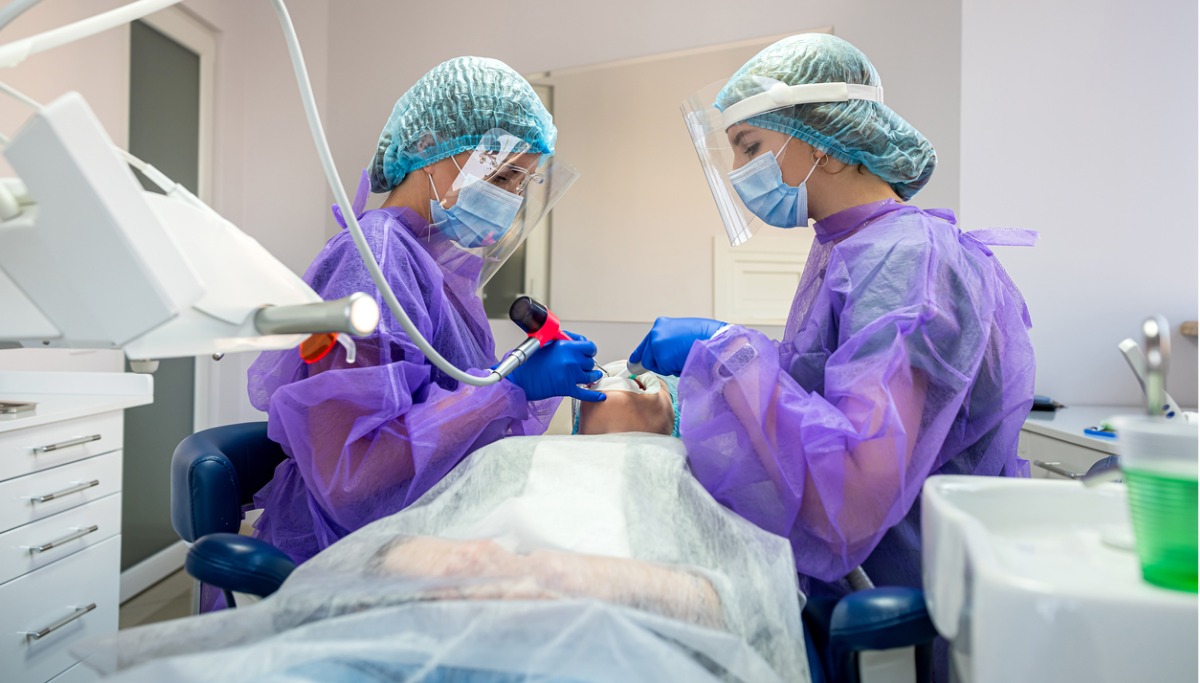Wisdom teeth extraction recovery
What should I expect during wisdom teeth extraction recovery?
After wisdom teeth removal, the first day or two are typically the most uncomfortable. After that time, you will usually start to feel more comfortable, but full recovery can take up to two weeks. Some people experience very little pain after surgery, while others may have a harder time depending on several factors, including the number of teeth removed and the difficulty of the extraction(s). During the recovery period, you may experience:
- A stiff, sore jaw
- An unpleasant taste in your mouth
- Tingling or numbness in your face, lips, or tongue
- Pain
- Visible bruising
- Swollen mouth and cheeks
When can I eat after wisdom teeth removal?
You should be able to remove the gauze that was placed in your mouth and eat soft foods as soon as one hour after your surgery. Be careful that the local anesthetic has worn off to avoid chewing your lips or cheeks. For a day or two post-surgery, you should only consume soft foods and liquids that require minimal chewing, and avoid chewing near the extraction site(s). Foods such as yogurt, high-protein smoothies (caution: do not use a straw to avoid dislodging the blood clot), mashed or pureed fruits and vegetables, applesauce, or pudding are all good choices. Also avoid hot drinks, spicy foods, or anything hard, crunchy, or sticky. Small, hard foods such as nuts or seeds can lodge in the open sockets and irritate the gum tissues.
How long does pain after wisdom teeth extraction last?
The amount of pain each person experiences after having their wisdom teeth extracted will vary, depending on the surgery outcome and your pain tolerance. If you are following proper after-care procedures, then your pain should not last longer than three days to one week. For example, for impacted teeth, your surgery will be more extensive, and you might experience longer-lasting post-operative pain.
Is it a dry socket or just pain?
When you undergo a tooth extraction, an empty socket will be left behind in the location of the old tooth and its roots. In the empty socket, a blood clot starts forming immediately, which protects the bone and contains cells that start the healing process. If your wound is healing properly, then the socket will begin to heal, and your pain should decrease daily. If your pain level suddenly increases after three or four days, and you experience throbbing pain, you likely have a dry socket, which results from a loss of the protective blood clot. Call your dentist right away, as you will need to be seen for further care to alleviate dry socket pain.
When can I stop worrying about dry sockets?
Seven to 10 days post-surgery, you can stop worrying about dry sockets. This is the normal range of time that it takes for proper healing to be well under way. However, age, oral health, and hygiene can cause people to heal at different rates.
Frequently asked questions about wisdom teeth extraction recovery
The exact duration of time you take off for the wisdom teeth recovery process differs for every individual and depends on the complexity of the extraction(s), potential complications, individual healing capacity, and the nature of your job. There is no set recommendation for amount of time off after wisdom tooth extraction, but it is commonly recommended that you take three to five days off work, school, and other routines for recovery. This allows the blood clot to form and the healing process to get well under way. If you have a job that requires more strenuous physical labor, then you may need additional days off for healing.
Typically, three days is sufficient to recover from wisdom teeth removal, especially if the teeth extraction procedure was straightforward and without complications. However, some people may need more time to recover, depending on discomfort, swelling, and other complications.
Pain after wisdom teeth extraction can vary based on the individual; however, most people experience the most significant discomfort within the first 48-72 hours after the procedure. The pain tends to gradually decrease after that period. Over-the-counter pain relievers are usually sufficient to manage the pain, although your dentist or oral surgeon may prescribe stronger pain medication, if necessary. If the pain persists or worsens after several days, it is important to contact your oral surgeon or dentist.
Your body will proceed at its own recovery pace, but you should give it all the assistance you can by carefully following your dentist’s or oral surgeon’s post-operative instructions.
Sources:
1. Wisdom teeth Removal. (2021, May 17) from https://www.nhs.uk/conditions/wisdom-teeth-removal/recovery
2. Wisdom teeth Removal. (2023, March 27) from https://my.clevelandclinic.org/health/treatments/22119-wisdom-teeth-removal
3. Post-Operative Instructions: Wisdom teeth Removal. (n.d.) from https://www.canyonofs.com/instructions-wisdom-teeth-removal/
4. Wisdom teeth Removal: What Adults Should Expect. (2021, October 31) from https://www.webmd.com/oral-health/wisdom-teeth-adult
5. What is the recovery time after wisdom teeth removal? (2023, January 9) from https://www.colgate.com/en-us/oral-health/wisdom-teeth/what-is-the-recovery-time-after-wisdom-teeth-removal
6. Dry Socket Vs. Normal Socket: What Are The Differences? (2022, April 4) from https://stephenspelmandds.com/blog/dry-socket-vs-normal
7. When Can I Stop Worrying About a Dry Socket? (2021, August 15) from https://www.pearlshinedentalclinic.com/when-can-i-stop-worrying-about-a-dry-socket
8. After teeth Extractions or Wisdom teeth Removal. (n.d.) from https://www.flagshipsurgery.com/instructions/after-oral-surgery






